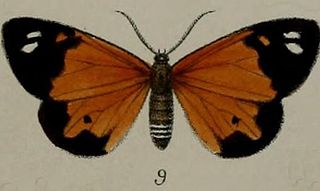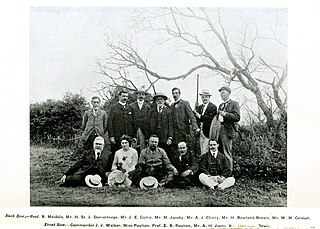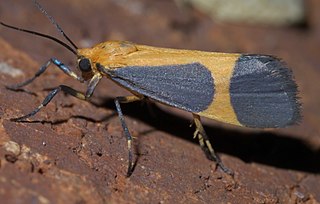Argyroeides is a genus of moths in the subfamily Arctiinae. The genus was erected by Arthur Gardiner Butler in 1876.

Cisthene is a genus of lichen moths in the family Erebidae. The genus was erected by Francis Walker in 1854.
Coreura is a genus of moths in the subfamily Arctiinae. The genus was erected by Francis Walker in 1865.

Cosmosoma is a genus of tiger moths in the subfamily Arctiinae. The genus was erected by Jacob Hübner in 1823.
George Claridge Druce, MA, LLD, JP, FRS, FLS was an English botanist and a Mayor of Oxford.

Isanthrene is a genus of moths in the subfamily Arctiinae. The genus was erected by Jacob Hübner in 1819.

Pseudosphex is a genus of tiger moths in the family Erebidae. The genus was erected by Jacob Hübner in 1818. These moths are mimics of a variety of Hymenoptera. The prefix pseudo means "false", and Sphex is a genus of wasps.
Saurita is a genus of moths in the subfamily Arctiinae. The genus was erected by Gottlieb August Wilhelm Herrich-Schäffer in 1855.

Virbia is a genus of tiger moths in the family Erebidae. The genus was erected by Francis Walker in 1854.

Oospila is a genus of moths in the family Geometridae described by Warren in 1897.

Pitthea is a genus of moths in the family Geometridae erected by Francis Walker in 1854.

Cisthene plumbea, the lead-colored lichen moth, is a moth of the family Erebidae. The species was first described by Richard Harper Stretch in 1885. It is found in eastern North America, from southern New Jersey south to northern Florida, west to Wisconsin and Texas.

Hamilton Herbert Charles James Druce was an English entomologist who specialised in Lycaenidae and to a lesser extent Hesperiidae. He is not to be confused with his father, the English entomologist Herbert Druce (1846–1913) who also worked on Lepidoptera.
Cisthene coronado is a moth of the family Erebidae first described by Carroll B. Knowlton in 1967. It is found in the US state of Arizona.
Cisthene martini, or Martin's lichen moth, is a moth of the family Erebidae first described by Carroll B. Knowlton in 1967. It is found in the US states of Arizona, New Mexico and Texas.
Cisthene citrina is a moth of the family Erebidae. It was described by Herbert Druce in 1885. It is found in Panama.
Cisthene deserta is a moth of the family Erebidae. It was described by Felder in 1868. It is found in North America, where it has been recorded from Utah and California.

Cisthene picta, the pictured lichen moth, is a moth of the family Erebidae. It was described by William Barnes and James Halliday McDunnough in 1918. It is found in the United States from Texas to Arizona. The habitat consists of deserts.
Cisthene polyzona is a moth of the family Erebidae. It was described by Herbert Druce in 1885. It is found in Mexico, Dominica and Rio de Janeiro, Brazil.
Cisthene subrufa, the Tamaulipan lichen moth, is a moth of the family Erebidae. It was described by William Barnes and James Halliday McDunnough in 1913. It is found in the United States in Arizona and from San Benito, Texas south to Veracruz in Mexico.









